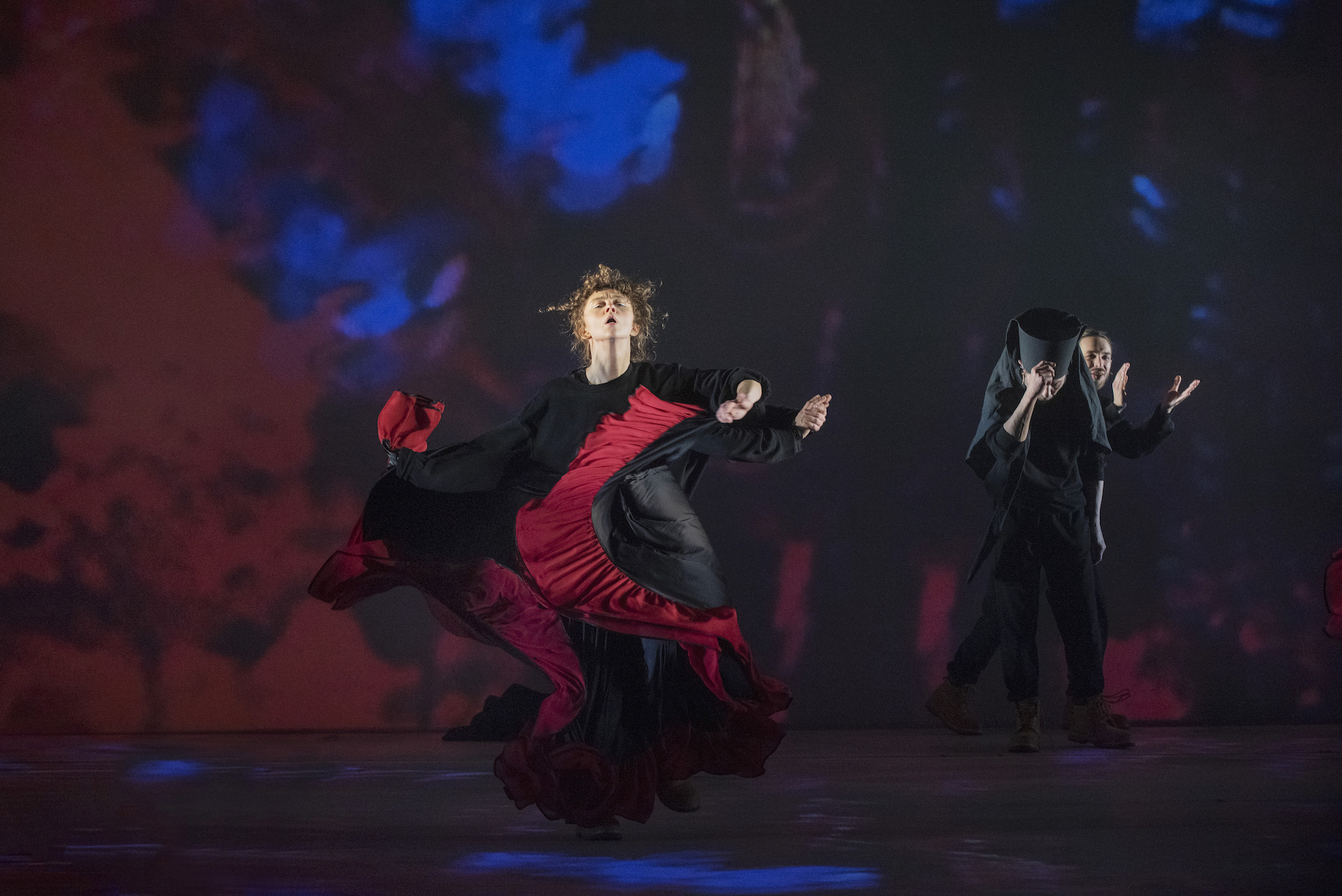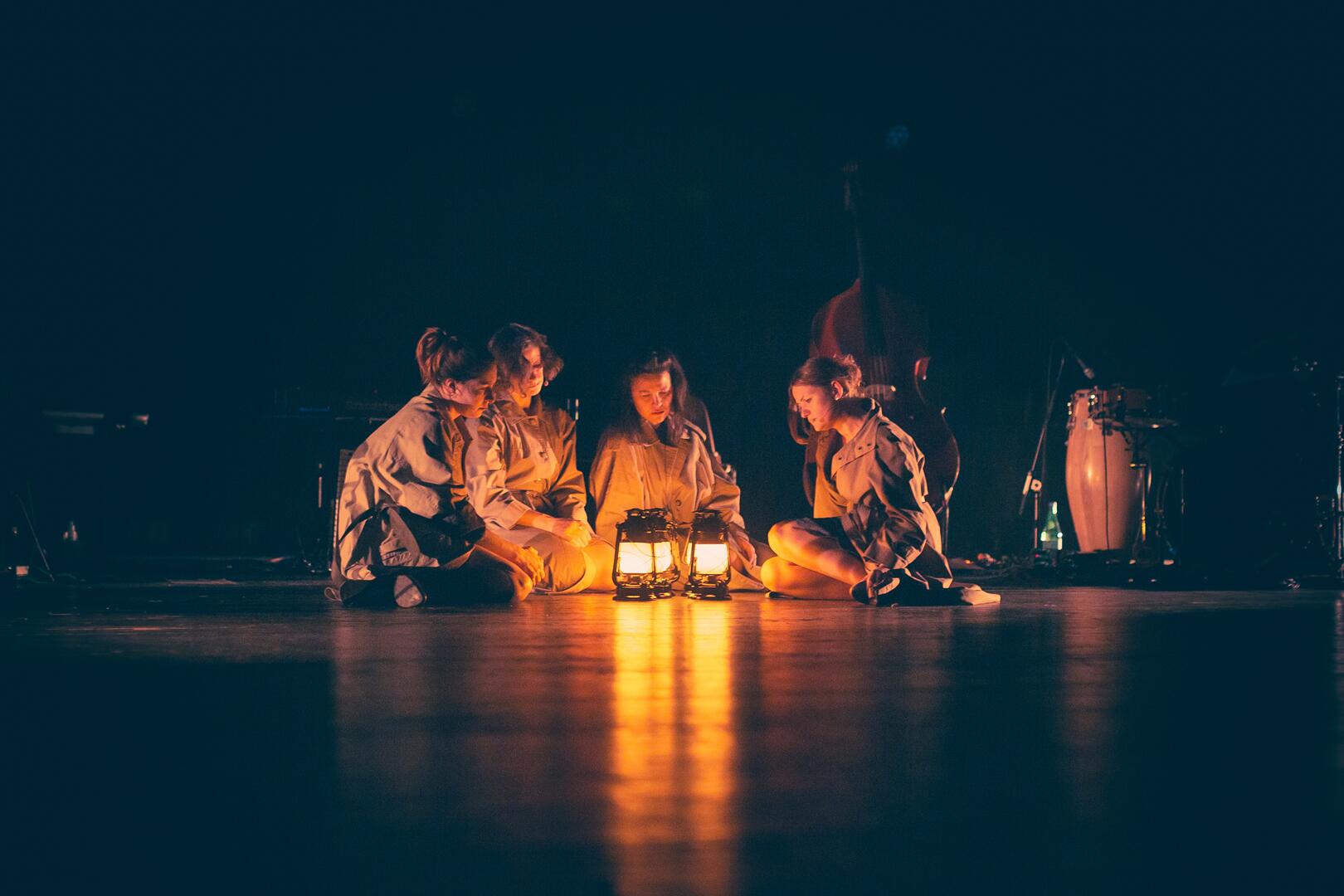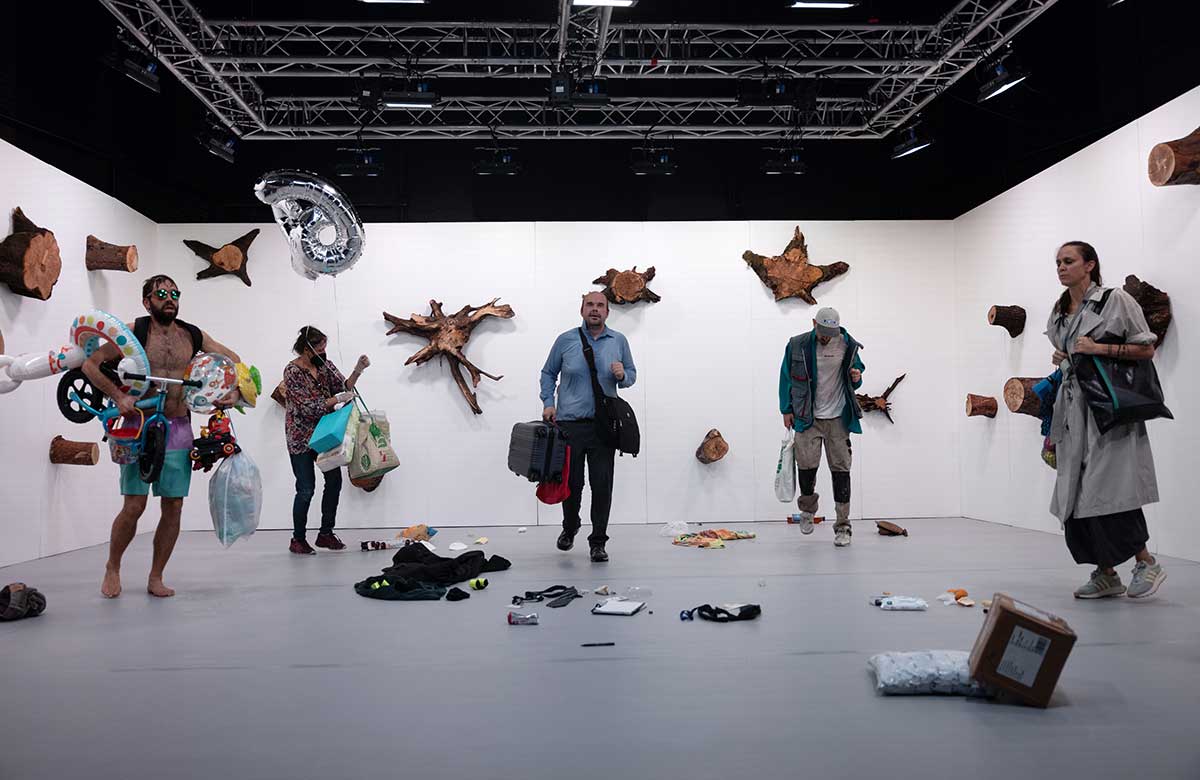This year’s Radar Ost, Deutsches Theater’s festival of eastern European work, focused on Ukraine. Tom Mustroph reports on this year’s programme, which also included work from Belarus Free Theatre and Slovenia’s Žiga Divjak.
Since 2018, the Radar Ost festival has been bringing theatre productions from oft ignored East European countries to the German capital. This year, at the beginning of the second year of the war in Ukraine, it developed into a kind of mobilization platform. While the productions themselves had quite different approaches, this focus on Ukraine often resulted in a loud portion of the audience delighting in patriotic slogans.
When the audience for Belarus Free Theatre’s show Dogs of Europe went to take their seats at the Deutsches Theater they found them already occupied. On every seat there was a photo of an imprisoned activist in Belarus. On mine there was a photo of Aleksandr Dainenko, deputy technical director of the Belarus news site tut.by. He has been detained since May 18th, 2021.
This gallery of victims of Alexander Lukashenko’s regime made for a strong beginning for Dogs of Europe, based on Alhierd Bacharevič’s dystopian novel. Published in 2017, the novel speculated about a big war between Russia and the West in 2025 and a resulting new empire, that would include not only Belarus, but a lot of the other ex-Soviet-territories. It seemed a classic dystopia: probable, yes, in a kind of worst-case geopolitical scenario, but also somehow unbelievable. Now the storytelling feels more anticipatory, and a sinister New Reich by Putin and the power circle around him looks altogether more probable. Some of the elements of oppression, which characterize this New Reich, have already been applied. Bacharevič’s book has since been banned in the writer’s home country.
Belarus Free Theatre’s production was first performed in 2020 in Minsk, in an underground location, hidden from the authorities, as is the case with all the company’s work. But people poured in, communicating by word of mouth, by text messages, sent from trusted people to trusted people, about the place and time. Sitting in safe places somewhere else in the world, one can only imagine to a certain degree the bravery it takes to attend such a performance let alone to perform it. There must have been a hunger, an urgent need, to take part in a performance of a story set in a dictatorship staged in a dictatorship itself, full of places and streets with the same names.
The Minsk of March 2020 – before the contested election of that summer and the anti-regime protests and oppressive clamp-down that followed – and the Berlin of March 2023 are obviously very different places. The company is also in a different place, after years performing underground, they finally left Belarus in 2021 after the situation in the country became too unsafe. Some initially went to Ukraine.

Dogs of Europe
Because of all this. there was much attention on the German premiere. Dogs of Europe seemed the perfect choice for Radar Ost, the festival, which looks to the east of Berlin. The use of the word ‘radar’ in the name of the festival also contains the notion of tracking down possible dangers, so it seemed even more perfect. Radar also embodies a certain distance; it suggests a position of safety in contrast to the dangers of the territory being observed and, by extension, also establishes a superior position; this could once have been seen as an un-reflected colonial behaviour. But recently this relationship has changed. There is no safe and distant position from which to observe things anymore. The fear and danger came closer. The ‘East’ was no longer represented by the selected artists, the audience was also pretty mixed. There were lots of Russian and Ukrainian words heard in the audience. This has its advantages, and challenges.
Though Dogs of Europe is set in the year 2049, it looked aesthetically more like Soviet Russia in the times of the trials of 1937. Part of the narrative is located in rural areas of former Belarus. But the empire and its representatives were depicted in a very old-fashioned way, that was prompting pity because of the obvious state of underdevelopment, rather than creating fear. There were interesting performance techniques on display. The separation of sound and action – as one actor performed, another produced the sound on a distant part of the stage like a foley artist in the film industry – intensified the atmosphere. It also highlighted how every action was artificially produced. The burning of books became a strong symbol on the stage, especially taking place some 100 yards from the big book burning by the Nazis in 1933. But, as a whole. Dogs of Europe was a somewhat weak illustration of dystopia.
It still prompted a significant part of the audience to wave Ukrainian flags and chant. It was a pity that the enrolment officer of the Ukraine embassy, located not far from the Deutsches Theater, was not present to recruit all those wannabe heroes. Don’t mistake me: nationalist ideas might be useful motivational fuel for those on the frontline, shivering in zones of devastation, fearing for their life, because Iranian drones discovered their position and made them an easy target for the enemy’s artillery. But voicing those slogans, far away from danger, and in a country, which produces part of its energy from horrifically overpriced Russian gas, with the money filling Putin’s war chest, is blatantly hypocritical.
Radar Ost felt in these moments like a weird mobilization machine. To be fair this has also occurred in other theatres in Germany recently. And Radar Ost should be rewarded for having had interests in the eastern parts of Europe long before the war. But it also has not developed (yet) the strength for a more thoughtful and nuanced approach.

Danse Macabre
A hint for the future might have come from Danse Macabre, by Dakh Daughters from Kyiv, with Dakh Theater founder Vald Troitskyi as director. This collage of live music and documentary theatre did not exhaust itself in telling of the atrocities of war. Yes, there were stories of killing and rape told by sometimes strong, sometimes faint voices, sometimes even voices, which were dissolved in tears, genuine tears, not the kind of crying taught in acting classes.
There was real suffering on the stage, prompted by these stories, told again and heard again. But the performance did not put Ukraine and the Ukrainian people completely in a position of sorrow and victimhood. Strength came there from different sources like erotic dreams (yes, people have these also in war), or strange tales about rural fortune-tellers, who survived Russian occupation while the Russian soldiers all died. Danse Macabre also consisted of more philosophical reflections about death as an eternal equalizer, and about the wish to remain human in an almost unbearable situation.
Maybe because of the more reflective nature of this show, which touched other strings in the resonance system of the audience, the calls for glory were much more muted than usual.

Crises. Photo: Jelena Jankovic
This year’s Radar Ost focused not only on the war in Ukraine. Crises by the young Slovenian director Žiga Divjak transformed the brutal forces of capitalism into a physically demanding hour for his performers. They were literally running on the spot, producing sweat in litres, dropping the bags and packages they were carrying. Divjak borrowed the methods of durational performances and applied them to more classical theatre. The main narrative line, that every evil comes from capitalist industrialization, one could argue with. Industries in socialist countries in the past often hurt the planet even harder because less attention was paid to environmental issues. Whether the craving for money or classes ideology or nationalist ideas (and the division into ‘us’ and ‘them’) separate and dehumanize people more, could be argued endlessly. While Crises pretended to have a global view, it focused only on capitalism. But this focus at least was strong. The fatigue, which captured the body in a seemingly eternal sprint for more success, more power – or for the more precarious among us: less poverty, less loss of the little socio-economic safety we have – the fatigue of daily life in capitalism was very dramatically shown in this one-hour athletic event.
Only when at the highest point of their exhaustion, did this young director allow his performers small attempts at collaboration. They bound their legs and arms, in order to appear perhaps as disabled people, victims of a very special war. Then they started to help each other, gently placing a pillow under someone’s head, or sharing some drops of water. passing food from lips to lips, or from lung to lung a cigarette – smoking as the most common way of being close to each other in hard hit places. Crises is a formally radical performance with a hint of hope – a fine counterweight to the main topic of the festival.
Further reading: Žiga Divjak: “We need to completely change our value system”
Further reading: Belarus Free Theatre: “We are stronger than a dictatorship”
Further reading: German Theatre and its attitude towards the ‘East’
Tom Mustroph works in Berlin and Palermo as a freelance journalist and dramaturg. He operates in several journalistic fields, such as theatre, fine arts and sports. He is most interested in how self-responsible work can succeed elegantly and in accordance to minimal moral standards. He collaborates with several German language publications such as taz, FAZ, Neues Deutschland, NZZ, Theater der Zeit, zeit online, Deutschlandfunk and WDR.








